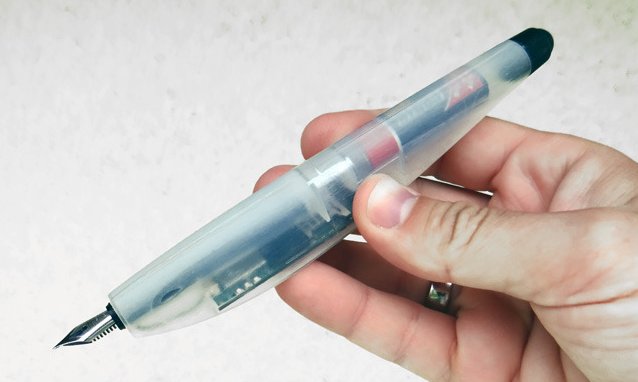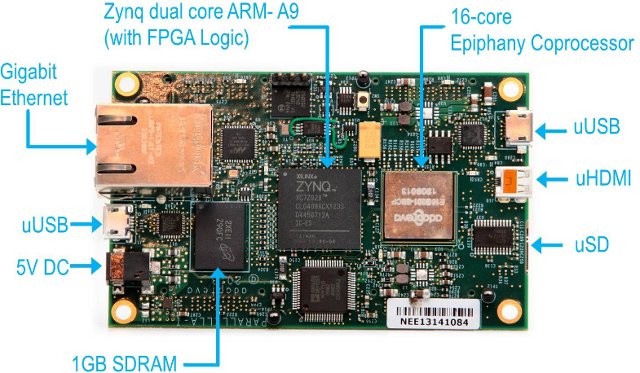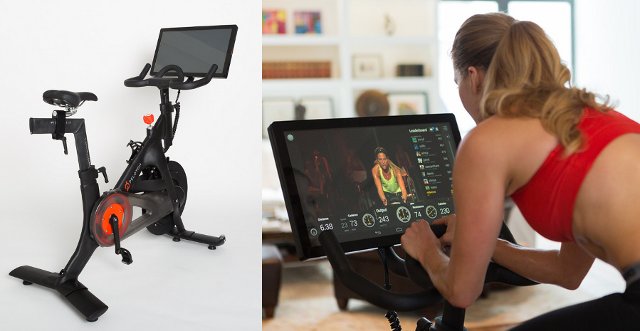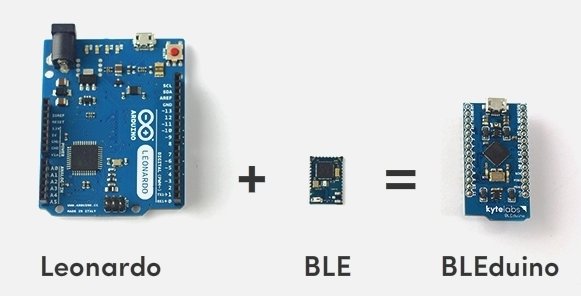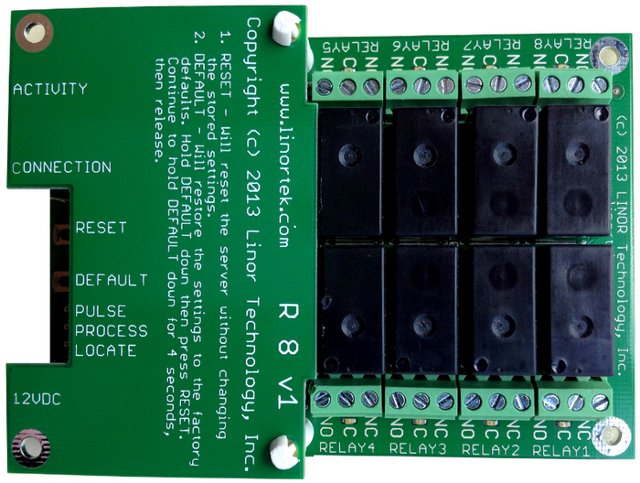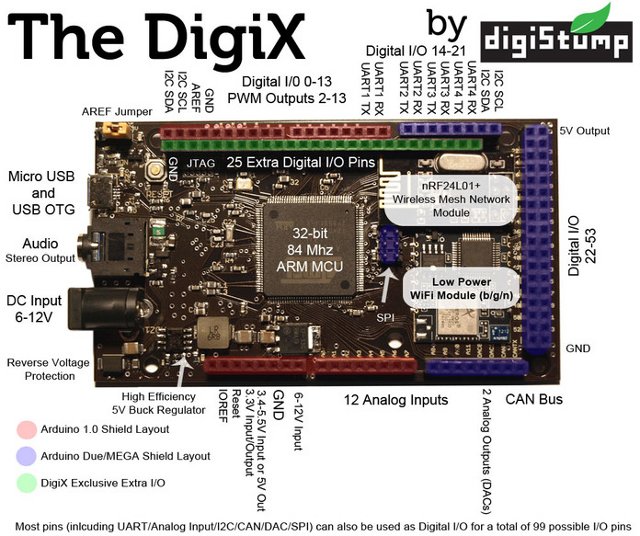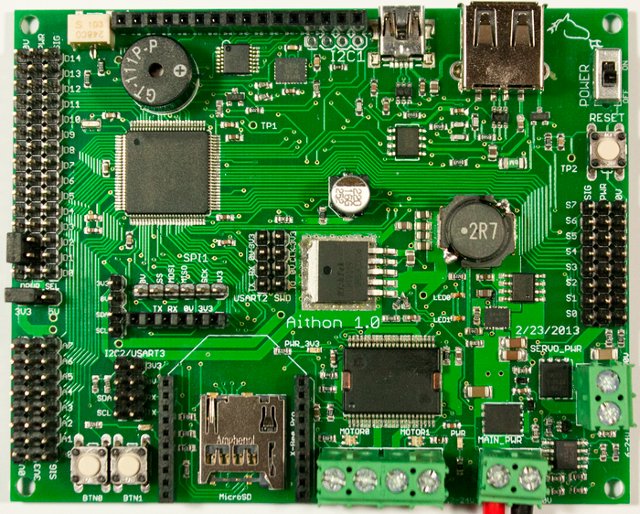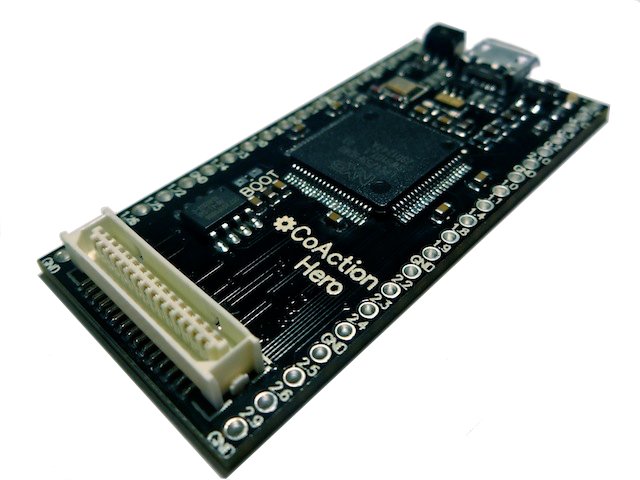Lernstift is a digital pen running Linux that aims at helping children learning how to write by vibrating when they’ve made calligraphy or orthography errors. I’ve covered the overall concept in an earlier post, which you can read for details. The company has made some progress, and they have just launched a kickstarter campaign where you can pledge 99 GBP (about $150) to receive the pen later this year or in early 2014. We do know a little more technical details. The first prototype was based on Gumstix Overo (TI OMAP3 or Sitara), but they are now working to design a custom board based on the platform for the final design. The pen comes with 128 MB RAM and runs embedded Linux. In order to gather handwriting data, Lernstift leverages a motion sensor that combines gyroscope with accelerometer, and adds a magnetometer. They’ve got a drawing with Freescale MMA9950L, but […]
$99 Parallella Supercomputer is Now Open Source Hardware
Parallella is a low cost supercomputer designed by Adapteva using Xilinx Zynq-7010/7020 FPGA+2x Cortex A9 SoC combined with Adapteva Ephipany 16 or 64 cores epiphany coprocessor. The project had a successful kickstarter campaign which allowed then to provide the 16-core version for $99, and the 64-core version for $750. The board will soon be shipped to people who pledged on kickstarter, and one of the promise of the campaign was to fully open source the platform, and today, they just fulfilled that. Before going into the details of the open source release, let’s have a look at the specs: SoC – Xilinx Zynq7000 Series (Z-7010 or Z-7020) Dual-Core ARM Cortex A9 with 512KB L2 Shared Cache Coprocessor – Epiphany Multicore Coprocessor. The Parallella-16 board includes the 16-core Epiphany-III processor The Parallella-64 board includes the 64-core Epiphany-IV processor System Memory – 1024MB DDR3L Boot Flash – 128 Mb QSPI Flash Indicators […]
Android Now Comes to Exercise Bikes thanks to The Peloton Bike
Beyond smartphones and tablets, Android is now running in a number of others devices such as cars, watches, set-top boxes and more, but Android should soon enter the gym, or rather bring the gym to your home, with the Peloton Bike, an exercise bike that comes with a 21.5″ touchscreen powered by Texas Instruments OMAP4 and running Android 4.1. Here are Peloton bike panel’s specifications: SoC – Texax Instruments OMAP 4470 dual-core Cortex A9 @ 1.5GHz System Memory – 1GB RAM Storage – 16GB internal flash Display – 21.5″ PCAP (projected capacitive) multitouch display (1080p resolution). Sweat resistant. Connectivity: 802.11 b/g/n Wi-Fi ANT+ wireless Bluetooth 4.0 10/100 Ethernet Audio – 3.5mm TRRS headphone and mic jack, 2x 3 watt stereo speakers Camera – 1.3MP front camera Misc – Peloton Cycle data connector as well as the key features of the bike itself: Carbon steel and aluminum monocoque frame Neodymium rare […]
$34 BLEduino Bluetooth 4.0 Low Energy Arduino-Compatible Board
After RFDuino, here’s another tiny low cost Bluetooth 4.0 SMART development board compatible with Arduino. BLEduino board is the merger of Arduino Leonardo and Bluetooth module, features Atmel ATmega32u4 MCU, Nordic Semi nRF8001 for BLE, and includes an on-board USB programming interface. Key features of BLEduino board: MCU – Atmel ATmega32u4 @ 16 MHz with 32 KB flash, 2.5 KB SRAM, and 1 KB EEPROM Power Supply – 5V. Onboard 5V & 3.3V regulators I/O: 21x GPIO Pins 6x PWM Channels 12x Analog Input Channels Serial Communication – UART, SPI, I2C LED – RX/TX for serial communication, LED for Bluetooth connectivity Bluetooth – Version 4.0 with Low Energy sypport via Nordic Semi nRF8001. Expected range: at least 24 meters Dimensions – Around 22.8 x 43.2 mm Kytelab, the company behind BLEduino, also provides “Shield-Shield”, a baseboard that translates BLEduino’s pin layout into the traditional Arduino layout, and allows you to […]
Linor Technology Fargo are Ethernet Boards with 4 to 8 Relays
There are more and more “IoT” solutions for home or industrial automation which allow you to control your lights or other equipments remotely with your smartphone or tablet. Many of them are DIY with boards such Arduino or Raspberry Pi combined with an expansion board featuring one or more relays, and some of them can be used out of the box such as Linor Technology Fargo boards. The company designed 4 boards that are powered by a Microchip PIC32 MCU with a small NOR flash, provide Ethernet connectivity, and run a small webserver that allows you to monitor and control the relays with any connected device that can run a web browser. Here are the hardware specifications for the boards (Fargo R8, R4, R4ADI and R4DI): MCU – Microchip PIC32 32-bit MCU Storage – 8MB flash on Fargo R8 for firmware and log storage (up to 10,000 items log) Sensors: […]
$59 Digitstump DigiX is an Arduino Due Compatible Board with Wi-Fi and Mesh Networking
The DigiX, by Digistump, is hobbyist board with an Atmel SAM3 Cortex M3 MCU @ 84 MHz, embedded low power Wi-Fi (b/g/n) and mesh networking,audio output, USB on the go support, and the company claims it is 100% compatible with anything that works with the Arduino Due, with some extra I/Os for a total of 99 I/O pins. The hardware specifications go as follows: MCU – Atmel AT91SAM3X8E 32-bit ARM Cortex M3 Processor @ 84 Mhz with 96KB SRAM, 512KB Flash Connectivity On-board 802.11b/g/n WiFi Module (FCC/CE Approved) On-board nRF24L01+ wireless module (removable) – 2.4Ghz band 99 I/O Pins including 12 PWM, 12 Analog Input, 2 Analog Output (DAC), CAN bus, 4x UARTs, 2x I2C, SPI, JTAG, DMA and more. Audio – 3.5mm stereo jack USB – micro USB OTG port Misc – On-board RTC, user LED Power Supply – 3.3V, 3.4-5.5V (LiPo Ready), 5V, or 6-16V input (on-board buck regulator) (Max?) Power […]
Aithon Motor Control Board Runs Chibios/RT RTOS
The Aithon board is a board powered by an STM32 Cortex M4 MCU destined at controlling motors and robotics applications. The board runs Chibios/RT, an open source RTOS, and a set of libraries are also provided to make programming the 2-channel motor driver, and other peripherals/sensors easier. Here are the specifications of the board: MCU – STMicroelectronics STM32F407 ARM Cortex-M4 @ 168 MHz, FPU, 512KB flash and 192KB RAM, up to 17 timers, an RTC, and 12-bit ADC I/O (All digital I/Os are 5V tolerant): 15 GPIO 8 ADC inputs and 8 PWM servo outputs Up to 3 USART (one shared with 1 I2C port + XBee) Up to 4 I2C (split between two independent buses) 1 SPI header 1 SWD header 1 12-bit DAC output (shared with SPI SCLK) USB – mini-USB (device) and standard USB (host) ports Expansion Headers: XBee socket Bluetooth header for optional Roving Networks RN42 […]
CoAction Hero – Low Cost ARM Cortex-M3 Board Running Open Source CoActionOS RTOS
CoAction Hero is a tiny board based on an ARM Cortex-M3 micro-controller (NXP LPC1759), that makes use of CoActionOS ecosystem that includes the hardware, but also an open source RTOS allowing multiple app to run concurrently, and a graphical interface to communicate with the board. First, let’s have a look at the hardware specs: Micro-controller – NXP LPC1759 ARM Cortex-M3 processor @ 120MHz with 64kB RAM and 512kB Flash ROM. Storage – 1MB serial flash chip (pre-loaded with CoActionOS) Expansion port micro USB connector. 40 I/O pins are available on both sides of the board, and the board can be inserted in a breadboard. You can currently connect 2 modules to the board: Bluetooth and LCD device boards. CoActionOS RTOS will come pre-loaded on the board, and if you don’t want to, you don’t even need to know it’s there, and it’s use will be transparent. But let’s have a […]


